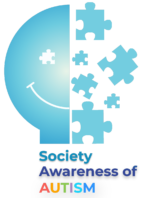
Each person with an Autism Spectrum Disorder (ASD) is Unique.
Some children who are on the spectrum start showing signs as young as a few months old. Others seem to have normal development for the first few months or years of their lives and then they start showing symptoms.
But up to half of the parents of children with ASD noticed issues by the time their child reached 12 months, and between 80% and 90% noticed problems by 2 years. Children with ASD will have symptoms throughout their lives, but it’s possible for them to get better as they get older.
The autism spectrum is very wide. Some people might have very noticeable issues, others might not. The common thread is differences in social skills, communication, and behavior compared with people who aren’t on the spectrum.
Some children and adults with autism have serious cognitive disabilities and sensory problems. They may display extremely repetitive behaviors including meltdowns, self-injury, defensiveness, and aggression. These are often provoked by anxiety and/or pain. Without appropriate intervention and an understanding of the underlying cause, behaviors may become persistent and difficult to change. Living with and caring for a person with autism can be challenging, requiring tremendous patience and an understanding of the condition.
Individuals with ASD may present with some of the following exceptional characteristics:
- Non-verbal reasoning (the ability to understand and analyze visual information and solve problems using visual reasoning)
- Exceptional memory
- Perceptual motor skills (hand-eye coordination, body-eye coordination, auditory language skills)
- Exceptional skills in creative and imaginative expression (music, art, writing, drama)
- Visuospatial ability (capacity to identify visual and spatial relationships among objects)
The above exceptional skills may be combined with subtle characteristics in other areas of development. All individuals with the diagnosis demonstrate some of the following:
- Impairment in social relationships
- Insufficient communication & use of language
- Repetitive & stereotyped body movements
- Dependence on routine
- Unconventional reactions to sensory stimulation
- Behavior problems
- Difficulties with sleeping, toileting, and eating
- Immune abnormalities.
- Gastrointestinal (gut) problems
As the children grow up, some with autism spectrum disorder become more engaged with others and show fewer disturbances in behavior. Some of them, usually those with the least severe problems, eventually may lead normal or near-normal lives. Others, however, continue to have difficulty with language or social skills, and the teen years can bring the worse behavioral and emotional problem.
